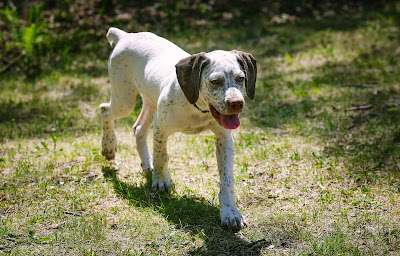Rare doesn't mean good...or bad.
One of my pet peeves is seeing breeders of less common gundog breeds use the term 'rare' as an advertising hook, as if 'rare' were a synonym for 'good'. On the other hand, it also bugs me when I hear people bad-mouth less common breeds by saying "they must be rare for a reason".
 |
| Braque Saint Germain |
When it comes to gundogs, rare does not mean good, or bad. Breeds become popular or remain rare for many reasons, usually totally unrelated to how good, or bad they actually are. Case in point: the Weimaraner. It is among the most popular gundog breeds in the world. Yet apart from a some superb individuals and a few good lines, as a hunting breed, it is in pretty rough shape overall. Trying to get a decent hunting dog by reaching in and picking a pup from any random Weim litter is like trying to hit a hole-in-one with a nine iron.
Compare that to the Braque de l'Ariege, one of the rarest breeds on the planet. Your chances of getting a decent hunting dog out of just about any Ariege litter are pretty darn good since there are no show lines of Braques de l'Ariege and no non-hunting breeders breeding them. Every single Braque de l'Ariege out there right now is a hunting dog. Most are decent, some are excellent, a few are world-class. None are worthless.
 |
| Saint Usuge Spaniel |
That said, there are some increased risks that come with rarer breeds, but those risks are not usually related to hunting ability or performance. For example, a small, closely-related population means that if a certain genetic problem crops up, a larger percentage of the overall breed can be effected and therefore present a greater risk to a purchaser. Case in point: Alopecia in the Pont Audemer Spaniel. Like other breeds with a curly coat, Ponto's can experience hair loss due to Canine Follicular Dysplasia. It is a purely cosmetic issue unrelated to performance, but it is a problem in the breed. And with so few individuals in the breed and so few lines, the only way to address the problem has been to outcross to unaffected dogs from other breeds like the Irish Water Spaniel.
 |
| Pont Audemer Spaniel |
Another issue that can have a greater effect on a rare breed is club politics. In big clubs, political rifts don't usually have much of an effect on the overall state of a breed. But in small clubs, in-fighting can be disastrous. Case in point: the Braque du Bourbonnais. A few years ago, a sort of leadership putsch occurred. The breed club's former president, the guy who actually re-created the Braque du Bourbonnais almost single-handedly, was forced out. The club is now in a shambles. It has more or less ceased doing anything for the breed (no trials, tests or shows) and the Bourbonnais population in France is in a free fall. In fact there are sometimes more Bourbonnais bred in the US than in France now!
 |
| Pachon Navarro |
Probably the most daunting task facing anyone interested in a 'rare' breed is actually getting a pup. I often get questions like: "How can I get a (insert rare breed name) puppy? Do I need to fly all the way to (insert name of foreign country)? I don't even speak (insert foreign language).
10 years ago, my answer would have been, YES, you need to fly to whatever foreign country the breed comes from and yes, you will need to overcome the language barrier somehow. But nowadays, thanks to the Internet, you can do much, if not all, of what is necessary to get a pup without ever leaving your own home town. But I would still encourage a trip to whatever country the dog is coming from just to experience the culture, food and wine!
 |
| Members of the Cesky Fousek Club, Czech Republic, 2007 |
To break it down in a sort of easy step-by-step, here is what I would do (and in fact have done) to get a pup from one of the rarer breeds.
 |
| Stabyhoun |
1. Identify the breed you want and make sure that it is still being bred to hunt. Case in point: the Stabyhoun, a rare 'gundog' breed from Holland. The Stabyhoun is still listed as a pointing breed, but in reality no one breeds Staby's for hunting anymore. In the entire world, there may be a handful of people that use their Staby to fetch the occasional duck. And that's it. Staby's can make fine pets, they have great looks and temperaments, but if you want a hunting dog, look elsewhere.
Among the less common breeds, I'd say that all the French breeds represent pretty decent odds of finding a good hunter (the Braque Saint Germain might be sort of iffy). Personally, I would get a Picardy Spaniel in a heartbeat, I love the French Spaniel and Braque d'Auvergne, I may get a Braque de l'Ariege one day. Both versions of the Braque Francais are great and the Bourbonnais is really coming along nicely in the US. The Portuguese Pointer offers better than decent odds and you can get a good Bracco Italiano or Spinone (from good lines....be careful). For more, see my book, I offer a sort of 'risk level' for all the breeds in it.
2. Make a connection with a breeder or two. Do it the same way you would here (but maybe with the help of Google Translate). Connect via the breed club or through forums, bulletin boards, Facebook etc. Look for HUNTERS who breed hunting dogs. Engage them on a hunter-to-hunter basis and see if you can see eye to eye. I now have some very dear friends in Europe because we had a sort of 'meeting of minds' about dogs and hunting. I have met many of my Euro friends in person, but there are quite a few that I have never actually met other than online...yet we are now like kindred spirits and have established a very high level of mutual trust and respect.
3. Go there to hunt or invite them here to hunt. I've done both. The hunting memories, stories and experiences you collect will be priceless. Get a second job, eat nothing but Kraft diner for a year, do whatever it takes. Just get there. It will change your life.
 |
| Baltrum, 2001 |
4. Get a pup. Either have it shipped here or (preferably) go there to pick it up. The experience will stay with you forever and a trip to Europe, especially to hunt, will blow your mind.
Finally, if you need help, just ask. I am happy to help out in any way I can and there are people in every club, in every breed that are willing to take the time to answer questions and help you get a good dog. After all, they are looking for good hunting homes for their hunting dogs. And the rarer breeds really could use a helping hand, especially from North American hunters. After all, where would the Bourbonnais be now without the folks in the US that are doing more for the breed than the parent club in France at the moment!
UPDATE 1. I've followed up this post with another that explores the reasons some breeds are popular, while others are not. You can read it here.
UPDATE 2: There is now a Braque du Bourbonnais right here in Manitoba! Check out the photos of Kolbi Chasseur d'Aspen Ridge "Kolbi" with his new family here or click on the photo below.
Enjoy my blog posts? Check out my book Pointing Dogs, Volume One: The Continentals
UPDATE 1. I've followed up this post with another that explores the reasons some breeds are popular, while others are not. You can read it here.
UPDATE 2: There is now a Braque du Bourbonnais right here in Manitoba! Check out the photos of Kolbi Chasseur d'Aspen Ridge "Kolbi" with his new family here or click on the photo below.
Enjoy my blog posts? Check out my book Pointing Dogs, Volume One: The Continentals














Excellant summary
ReplyDelete